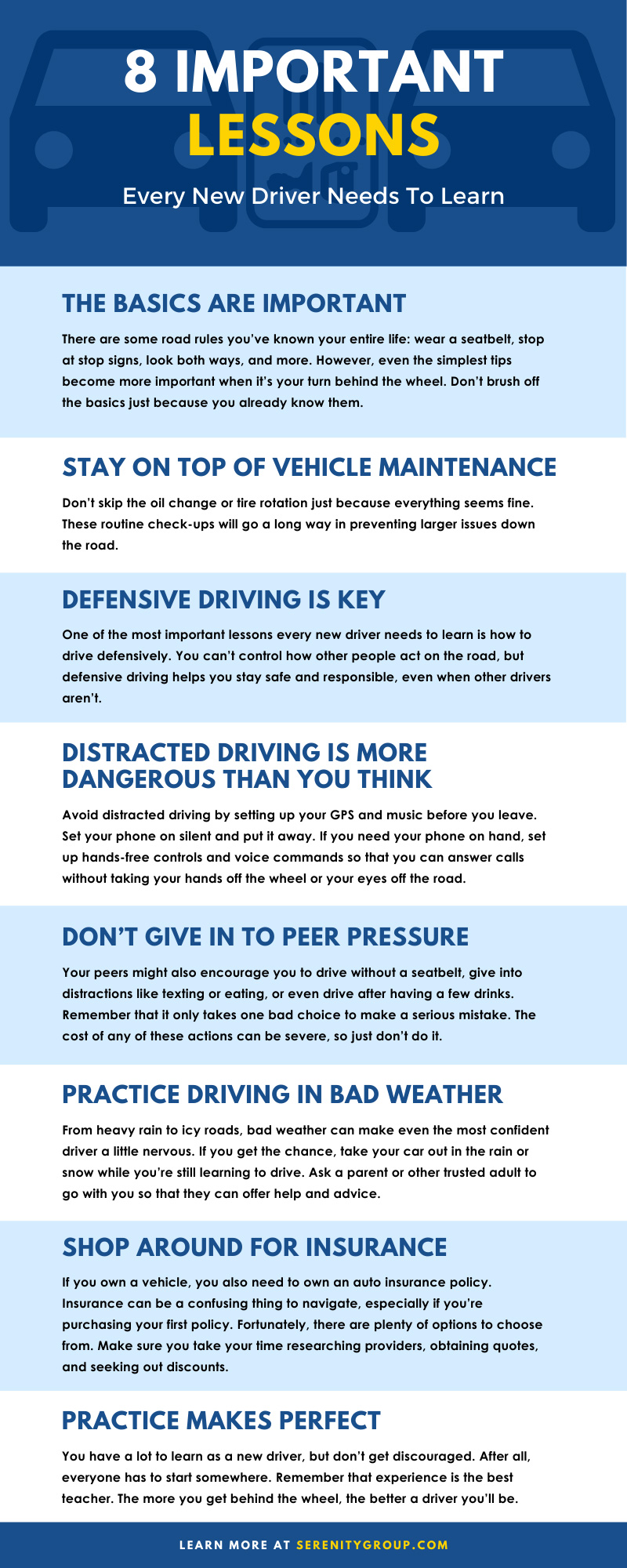8 Important Lessons Every New Driver Needs To Learn

There’s nothing like getting behind the wheel for the first time. Earning your license means earning a sense of independence and freedom. However, these rewards come with an important responsibility. Young drivers need to take their newfound independence seriously. This is why states require hours of practice and education before you can hit the road on your own. Even after you have your brand-new license in hand, there are still a few key things to keep in mind every time you slide into the driver’s seat. Start your driving career off on the right foot with these important lessons every new driver needs to learn.
The Basics Are Important
There are some road rules you’ve known your entire life: wear a seatbelt, stop at stop signs, look both ways, and more. However, even the simplest tips become more important when it’s your turn behind the wheel. Don’t brush off the basics just because you already know them. Make a point to wear your seatbelt and ensure your passengers do the same. Every time you get into your car, adjust the mirrors, seat, and steering wheel to a position that’s comfortable for you. Use your blinker, and do your best to communicate with other drivers on the road. When you practice these basic tips as a new driver, you create safe driving habits that will benefit you for the rest of your life.
Stay on Top of Vehicle Maintenance
The first time your vehicle breaks down can be scary and overwhelming. Don’t worry too much—problems happen, and maintenance is a regular part of driving your own car. However, you can prevent many issues by staying on top of regular repairs and maintenance. Don’t skip the oil change or tire rotation just because everything seems fine. These routine check-ups will go a long way in preventing larger issues down the road. By taking good care of your vehicle now, you can extend its life and keep driving safely for years to come.
Defensive Driving Is Key
One of the most important lessons every new driver needs to learn is how to drive defensively. You can’t control how other people act on the road, but defensive driving helps you stay safe and responsible, even when other drivers aren’t. Practice key defensive driving techniques like leaving plenty of space between your vehicle and the vehicle ahead of you, obeying the speed limit, and braking or accelerating gently rather than making hard starts and stops. Another vital part of defensive driving is always being aware of your surroundings. Know where other vehicles are on the road as well as where your next turn or lane change is. You should also keep an eye out for unexpected elements such as construction zones, cyclists, or pedestrians.
Distracted Driving Is More Dangerous Than You Think
You use your phone to text, call, listen to music, find directions, and so much more. With how handy these devices are, it can be tempting to keep your phone out and within reach while driving. As common as texting and driving may be, it’s important to never do it. Even a quick glance at your phone’s screen requires you to take your eyes off the road for a couple of seconds. A lot can change during that brief amount of time, especially when you’re driving at highway speeds. Plus, answering texts while driving occupies your hands and mind, even if you keep looking at the road. Avoid distracted driving by setting up your GPS and music before you leave. Set your phone on silent and put it away. If you need your phone on hand, set up hands-free controls and voice commands so that you can answer calls without taking your hands off the wheel or your eyes off the road.
Don’t Give in To Peer Pressure
Many young drivers are already familiar with the struggle of peer pressure. When you get behind the wheel, however, the suggestions and expectations of your friends can prove dangerous. It’s easy to want to speed, swerve, race, or try other reckless driving behaviors in the name of fun and adrenaline. Your peers might also encourage you to drive without a seatbelt, give into distractions like texting or eating, or even drive after having a few drinks. Remember that it only takes one bad choice to make a serious mistake. The cost of any of these actions can be severe, so just don’t do it. Instead, establish rules for your passengers, and make sure everyone respects you and your vehicle whenever they ride with you.
Practice Driving in Bad Weather
No matter where you live, there’s going to come a time when you have to drive in poor conditions. From heavy rain to icy roads, bad weather can make even the most confident driver a little nervous. If you get the chance, take your car out in the rain or snow while you’re still learning to drive. Ask a parent or other trusted adult to go with you so that they can offer help and advice. This gives you more control over the situation, making it easier to learn how to navigate inclement weather. You’ll be grateful when you don’t have to try driving through snow for the first time while running late or going somewhere you’ve never been before.
Shop Around for Insurance
If you own a vehicle, you also need to own an auto insurance policy. Insurance can be a confusing thing to navigate, especially if you’re purchasing your first policy. Fortunately, there are plenty of options to choose from. Make sure you take your time researching providers, obtaining quotes, and seeking out discounts. Keep in mind that every state has different laws regarding auto insurance, so you should read up on your state’s requirements as well. This research and information will help you to make sure your policy is suitable and affordable, especially if you’re a driver who needs SR22 insurance in Washington, California, or any other state with an SR22 requirement.
Practice Makes Perfect
You have a lot to learn as a new driver, but don’t get discouraged. After all, everyone has to start somewhere. Remember that experience is the best teacher. The more you get behind the wheel, the better a driver you’ll be. If you practice these safe and responsible habits throughout your adult life, you can keep yourself, your passengers, and your vehicle in good shape every time you hit the road.


Recent Comments